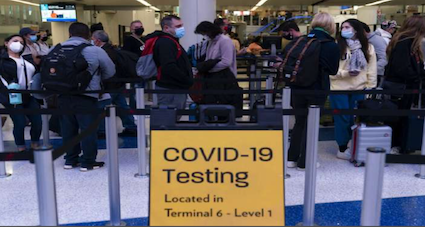The Indian government has passed a series of measures for arriving international passengers in view of the Omicron variant threat of Covid 19.
The rule is true for all passengers arriving in the country from various points of entry—airports, seaports and land borders. They are required to abide by the guidelines and sign an undertaking.
Pre-boarding measures
As per the pre-boarding measures, the passengers must:
- Upload a negative RT-PCR report conducted within 72 hours before the time of travel.
- Submit a self-declaration form that must include travel details from the last 14 days. The form can be found on https://www.newdelhiairport.in/airsuvidha/apho-registration.
- Submit an authenticity declaration report.
Boarding measures
Here are the guidelines for the time of boarding:
- All passengers must download the Aarogya Setu app on their phones.
- Post the thermal screening, only asymptomatic passengers will be permitted to board the flight.
- Only the passengers who have submitted the self-declaration form and negative RT-PCR report shall be permitted to board the flights.
Post arrival measures
Here are the post-arrival measures laid down by the government:
- All passengers are required to go through post-arrival testing.
- Thermal screening shall also be carried out and passengers will be required to show the self-declaration form.
Quarantine and isolation measures – ‘At-risk’ countries
Here are the quarantine and isolation measures laid down by the government for passengers from ‘at-risk’ countries:
- Passengers who exhibit symptoms shall be isolated immediately.
- Passengers must submit a post-arrival COVID-19 test. They shall not be allowed to board another flight or leave the airport without a negative test result.
- Passengers must follow 7 days of home quarantine, retest on the 8th day of arrival, and proceed to follow another 7 days of self-monitoring of health (in case of a negative result).
- The samples of COVID-19 positive shall be sent to the INSACOG laboratory network for genomic testing.
- A separate isolation facility shall be provided for such passengers.
- Suspected individuals who came into contact with infected passengers shall be monitored closely and quarantined.
Quarantine and isolation measures
Here are the quarantine and isolation measures laid down by the government:
- Post arrival, asymptomatic passengers are required to self monitor their health for 14 days.
- Similar isolation, quarantine, and testing protocols as passengers from ‘at-risk’ countries shall be followed for COVID-19 positive passengers from other countries.
Exceptions
Here are some exceptions that must be highlighted:
- Passengers arriving at seaports must submit a self-declaration form upon arrival as there are no pre-registration facilities available for them.
- Children below the age of 5 are not required to go through the above-mentioned testing measures. However, they shall not be exempted from the quarantine and treatment protocols if infected.
What are the ‘at-risk’ countries?
Here are the ‘at-risk’ countries that need to follow India’s international travel guidelines:
- Countries in Europe including The United Kingdom
- South Africa
- Brazil
- Botswana
- China
- Mauritius
- New Zealand
- Zimbabwe
- Singapore
- Hong Kong
- Israel


